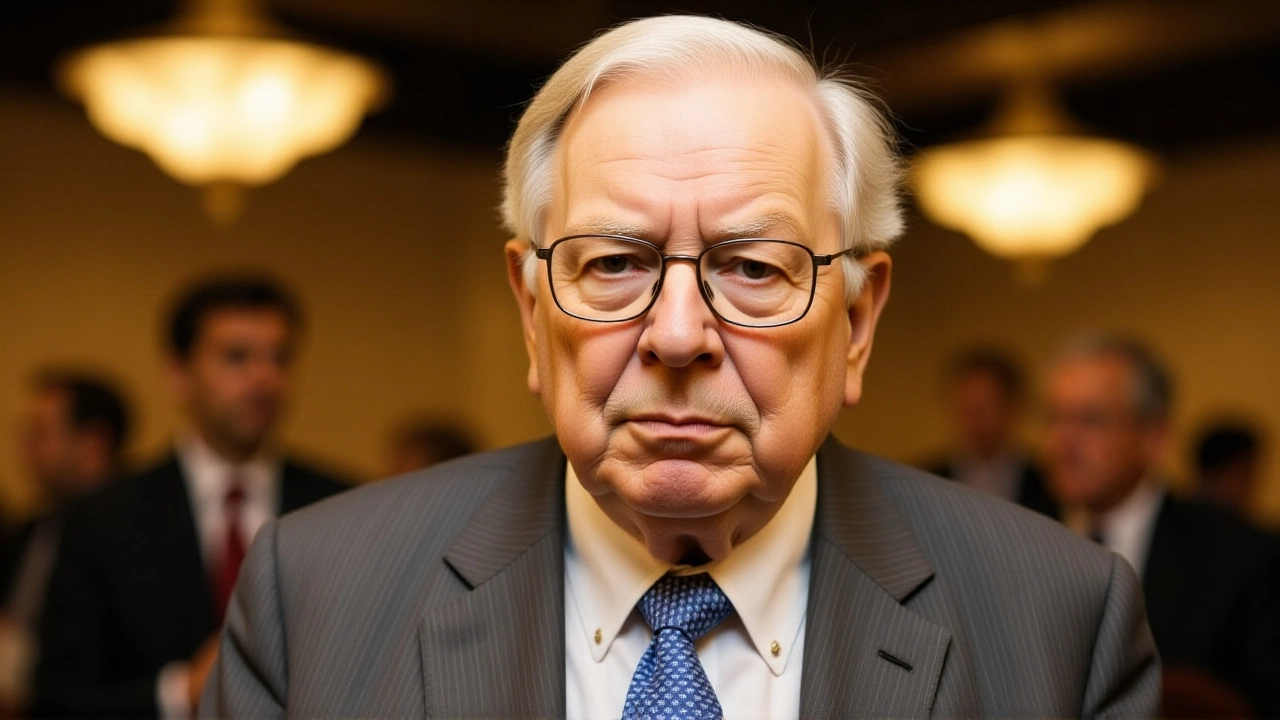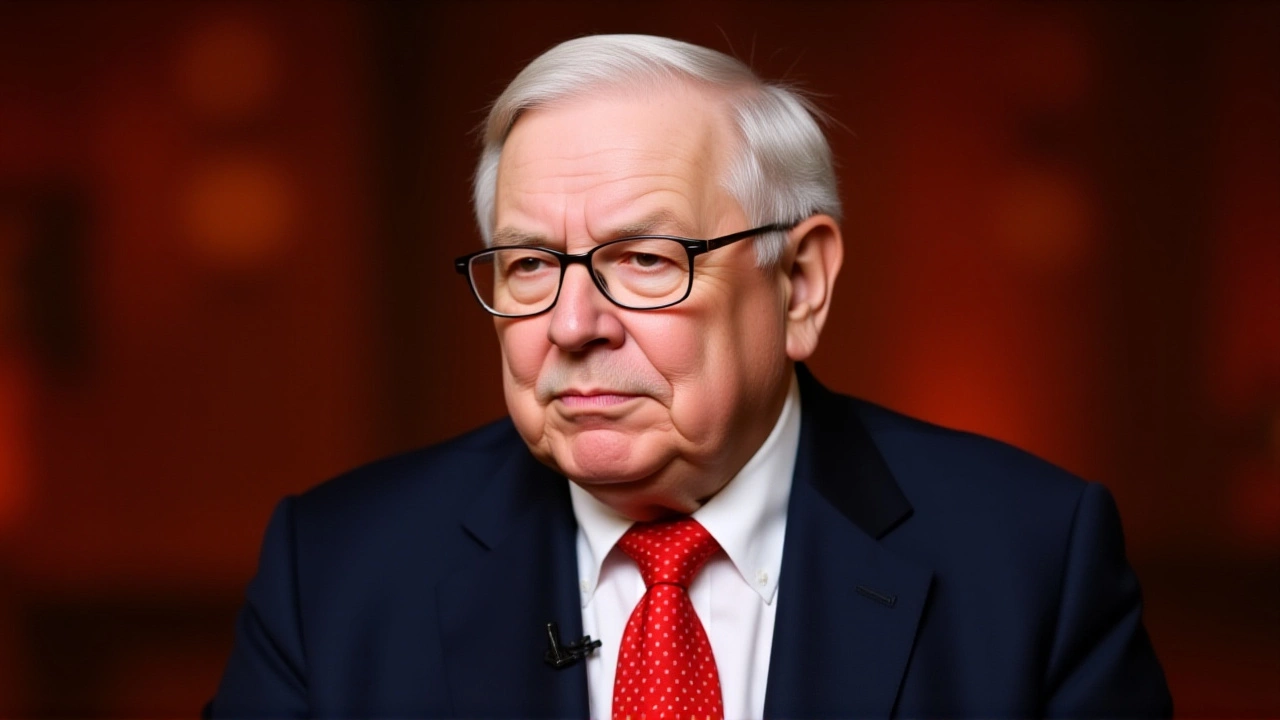When Warren Buffett called gold "a pet rock" two decades ago, he wasn’t just being colorful—he was making a philosophical point about value. Today, as gold futures hit $4,350 per ounce in November 2025, even his most ardent followers are asking: Is the Oracle of Omaha wrong? The answer isn’t simple. Buffett still won’t buy gold. But the world around him is changing—and fast.
Why Buffett Hates Gold (And Why He’s Not Alone)
Buffett’s disdain for gold isn’t new. In his 2011 shareholder letter, he laid it out plainly: "Gold… has two significant shortcomings, being neither of much use nor procreative." He argued that unlike a farm, a factory, or even a candy company like See's Candies—which he’s praised for its pricing power and consistent profits—gold just sits there. It doesn’t grow. It doesn’t pay dividends. It doesn’t innovate. That view shaped Berkshire Hathaway Inc.’s investment philosophy for 60 years. Under Buffett’s leadership, the Omaha-based conglomerate built a $304 billion portfolio of productive assets: Coca-Cola, Apple, American Express, and railroads—all businesses that generate cash flow, expand operations, and reinvest profits. Gold? Not even a whisper.The 2020 Anomaly: A Crack in the Armor?
Then, in 2020, something unexpected happened. Berkshire Hathaway quietly bought shares in Barrick Gold Corporation, the Toronto-headquartered mining giant. It was a shock. Analysts scrambled. Was Buffett softening? Had he finally admitted gold had a role? The answer came two years later: no. Berkshire sold its entire Barrick position. Buffett didn’t change his mind—he just tested the waters. "It was a hedge against uncertainty," one insider later told Barron’s. "Not a bet on gold. A bet on the system breaking." And now, the system might be breaking.Gold’s Surge: When Fear Outpaces Faith
By July 21, 2025, gold had climbed 198% over the past decade. Not bad. But BRK.A had surged 232%. Still, gold’s 2025 spike—jumping from $2,400 in early 2024 to over $4,350 by November—wasn’t about performance. It was about panic. The Committee for a Responsible Federal Budget forecast the U.S. government would spend $22.7 trillion more than it takes in over the next decade. That’s not a deficit. That’s a fiscal avalanche. With the national debt already at $37.9 trillion, projections point to $60 trillion by 2035. Investors, sensing dollar erosion, flooded into gold. "It’s not that gold is rising," said Will McGoff, Deputy Chief Investment Officer at Prime Capital Financial. "It’s that trust in government bonds and fiat currency is falling. Gold’s just the canary in the coal mine."Berkshire’s $100 Billion Cash Hoard: The Real Signal
Buffett’s $100 billion cash pile isn’t just a safety net—it’s a statement. While others chase yield, he waits. He’s betting on opportunity, not inflation. He’s betting that when markets panic, he’ll be the one with bullets. And history backs him. During the April 2025 stock market panic, when the NASDAQ plunged 12% in a week, BRK.A rose. Why? Because investors saw Berkshire not as a stock, but as a fortress. It owns utilities, insurers, railroads—assets that keep running even when the economy stumbles. "Gold is insurance," said economist Writing Everyday in a July 2025 analysis. "Buffett’s cash is a weapon."
Who’s Winning? The Numbers Don’t Lie
Consider this: a $50,000 investment in gold 30 years ago would have grown to $497,572. Sounds impressive? Now compare it to the S&P 500: $1,046,808. The same money in Berkshire Hathaway Class A shares? Even higher. Buffett’s edge isn’t magic. It’s compounding. A business that earns $10 million today can earn $20 million in five years. Gold? Still one ounce. Always. Yet here’s the twist: even Buffett’s critics now say gold deserves a place. "If you’re retired, or managing an endowment, you need something that doesn’t care about Fed policy," said Joshy Lipton, anchor at Market Domination, on November 7, 2025. "Gold doesn’t have to make sense. It just has to hold value when everything else looks shaky."What Comes Next?
Buffett, now 94, has spent his final years preparing for succession. Greg Abel, his handpicked CEO, will take over with full board support. Abel, a pragmatic investor, has never publicly endorsed gold—but he’s also never dismissed it. That silence speaks volumes. Meanwhile, gold keeps climbing. Central banks in China, Russia, and India are buying. Retail investors in Europe and the U.S. are snapping up physical bars. Even pension funds are quietly adding 5–10% allocations. Buffett won’t follow. He never will. But the market? It’s already moved on.Frequently Asked Questions
Why is gold surging now if Buffett still hates it?
Gold’s 2025 surge isn’t about fundamentals—it’s about fear. With U.S. debt projected to hit $60 trillion and inflation stubbornly high, investors are fleeing dollar-denominated assets. Gold, despite its flaws, has no counterparty risk. It’s physical, global, and doesn’t rely on any government’s promise. Buffett’s objections remain valid, but they don’t matter to someone worried about their savings losing value overnight.
Did Berkshire Hathaway’s 2020 gold investment mean Buffett changed his mind?
No. Berkshire’s brief stake in Barrick Gold was a tactical hedge, not a philosophical shift. The position was closed within two years, and Buffett never publicly endorsed it. Analysts believe it was a low-cost insurance policy during pandemic-era uncertainty, not a vote for gold as an asset class. His core philosophy—favoring productive businesses—remains unchanged.
How does gold compare to Berkshire Hathaway stock over the last decade?
From 2015 to 2025, Berkshire Hathaway Class A shares returned 232%, outpacing gold’s 198% gain. Even during the 2022 market correction and April 2025 panic, BRK.A held firm or rose, while gold spiked only briefly. The key difference? Berkshire owns businesses that earn money. Gold doesn’t. Over time, compounding earnings beat static value.
Should regular investors buy gold today?
For most people, a small allocation—5% to 10%—makes sense as a hedge against currency devaluation or geopolitical chaos. But it shouldn’t replace core holdings like index funds or dividend-paying stocks. Gold is insurance, not growth. Warren Buffett’s portfolio proves you can thrive without it. But in times like these, even the most disciplined investors keep a little on hand.
What’s the long-term outlook for gold if U.S. debt keeps rising?
If U.S. debt climbs toward $60 trillion and the Fed keeps printing money to cover it, gold could keep rising—not because it’s inherently valuable, but because confidence in the dollar erodes. Historically, gold has performed best during periods of fiscal irresponsibility, like the 1970s. The difference now? Central banks are actively buying, and digital currencies haven’t replaced gold as the ultimate fallback.
Why does Buffett hold so much cash if he thinks gold is useless?
Buffett’s $100 billion cash pile isn’t idle—it’s ammunition. He sees cash as the most liquid, zero-risk asset that can be deployed when others are forced to sell. While gold is a store of value, cash is a tool. Buffett doesn’t want to own gold because he wants to own entire businesses when prices crash. Cash lets him do that. Gold doesn’t.

